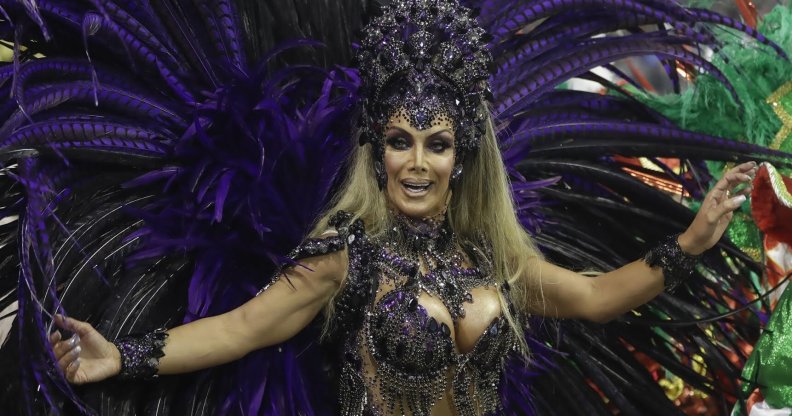Brazilian dancer makes history as first openly trans woman at Carnival to take the prestigious role of ‘godmother of the drummers’

Camila Prins dancing at the Carnival in Sao Paulo. (Twitter/lisaloopners)
A dancer in Brazil has made history as the first known trans woman to star as “godmother of the drummers” in Sao Paulo’s Carnival parade.
Camila Prins shattered taboos to lead the parade, fulfilling a dream she’d had for almost three decades.
Last Saturday, Prins led the drum section of a top samba school at the Carnival parade.
She was handpicked to be the “godmother” of the Colorado do Brás samba school’s drum section, an iconic role that is fought over every year by models and celebrities.
Wearing a costume of feathers, the moment was particularly poignant for Prins because she first realised she is a woman at a Carnival party when she was 11.
Her duty last weekend was to dance for over an hour in front of the drummers, using her legs to drive the rhythm while judges looked on and assessed the samba school’s parade.
“Gorgeous women wanted to be here. I’m very excited because this shows we can be anywhere. We can be godmother of the drummers, we can be owners of a samba school,” Prins said before the parade.
“Soon they will see many other transgender girls, who will find it easier than I did.”
Colorado do Brás’ choice of Prins for the role marks a bold moment, given that there is still a high level of taboo and stigma associated with transgender people in Brazil.
Last year, 124 trans people were violently killed in the country. Twenty-one of those were in Sao Paulo state.
Colorado do Brás finished in 11th place at last year’s Carnival, only two spots above being relegated down to a lower league.
Keila Simpson, the president of Brazil’s National Association of Transvestites and Transsexuals, said she was happy for Prins and that the community wants to make successes like hers more normal for the trans community.
“We have to be proud of Camila and hope her symbolic message allows us to think of reducing violence against trans people. Why can people celebrate her at the Sambadrome while trans people on the street are subject to violence?” Simpson said.
“We don’t have data, but there are many violent cases against us during Carnival. Because there’s more of us outside, there’s more attacks.”
A trans woman who works as an English teacher, Alessandro Salvador, said she was excited to see Prins in the parade.
“I don’t even watch parades that much, but this year I will when she is on,” Salvador said.
“It is good to see one of us being talked up. We don’t get it so often. If we don’t get that in Carnival, we won’t get it anywhere else.”

